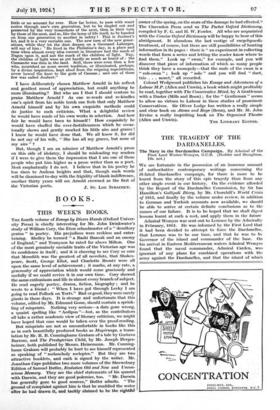BOOKS.
THIS WEEK'S BOOKS.
THE fourth volume of Essays by Divers Hands (Oxford Univer- sity Press) is chiefly interesting for Mr. John Drinkwater's study of William Cory, the Eton schoolmaster of a " desultory genius " in poetry. His prejudices were reckless and enter- taining. Shelley he termed " a Bashi Bazouk and an enemy of England," and Tennyson he rated far above Milton. One of the most genuinely enviable traits of the Victorian age was its confidence in itself ; and it is cheering to see. Cory so sure that Meredith was the greatest of all novelists, that Shakes- peare, Scott, George Eliot, and Charlotte Brontë were all upon the same level of achievement ; it marks, at any rate, a generosity of appreciation which would come graciously and usefully if we could revive it in our own time. Cory showed the same enthusiasm and life in almost every branch of subject. He read eagerly poetry, drama, fiction, biography ; and he wrote to a friend " When I have got through Lecky I am going to read Pollock on Torts." Bad or good, they were surely giants in those days. It is strange and unfortunate that this volume, edited by Mr. Edmund Gosse, should contain a sprink- ling of misprints. Nothing very serious—a date gone wrong, a quaint spelling like " Aedipus "—but, as the contributors all take a rather academic view of literary criticism, we might have hoped that care would be taken over the proof-reading.
But misprints are not so uncomfortable in books like this as in such beautifully produced books as Mapirunga, a trans- lation by Mr. R. B. Cunninghame Graham of a tale by Gustavo Barroso, and The Presbyterian Child, by Mr. Joseph Herges- heimer, both published by Messrs. Heinemann. Mr. Cunning- hame Graham will probably be hurt to see himself represented as speaking of " melancholy melopies." But they are two attractive booklets, and each is signed by the writer. Mr. Jonathan Cape publishes two more volumes of the Shrewsbury Edition of Samuel Butler, Evolution Old and New and Uncon- scious Memory. They are the chief statements of his quarrel with Darwin, and they are good polemics, too. " Mr. Darwin has generally gone to good sources," Butler admits. " The ground of complaint against him is that he muddied the water after he had drawn it, and tacitly claimed to be the rightful owner of the spring, on the score of the damage he had effected." The Clarendon Press send us The Pocket Oxford Dictionary, compiled by F. G. and H. W. Fowler. All who are acquainted with the Concise Oxford Dictionary will be happy to hear of this abridgment. It abandons the last vestige of encyclopaedic treatment, of course, but there are still possibilities of hunting information in its pages : there is " an experiment in collecting words that form a series and letting the reader know where to find them." Look up " swan," for example, and you will discover that piece of information of which so many people think they have a monopoly—that the male of the swan is a " cob-swan " ; look up " solo " and you will find " duet, trio . . . nonet," all recorded.
Colonel Wedgwood publishes his Essays and Adventures of a Labour M.P. (Allen and Unwin), a book which might profitably be read, together with The Conservative Mind, by A Gentleman with a Duster (Mills and Boon) ; for the " Gentleman " seems to allow no virtues to Labour in these studies of prominent Conservatives. Sir Oliver Lodge has written a really simple and clear book on Atoms and Rays (Been), and Mr. St. John Ervine a really inspiriting book on The Organised The,ahre (Allen and Unwin). THE LITERARY EDITOR.






































 Previous page
Previous page